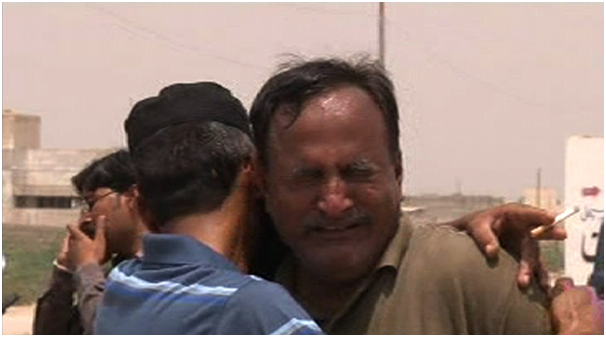Islamic State Enters Pakistan Through Jundullah 'Soldiers of Allah' Thousands Recruited
Relatives break down after the terror attack on a bus in Karachi killed 43 persons

NEW DELHI: Jundullah “Soldiers of Allah” that swore allegiance to the Islamic State last November struck in Karachi, killing 43 Ismaili Shia Muslims and injuring 20 others in a bus. This militant organisation was associated with the Tehrik-i-Taliban Pakistan with the deadly attack feeding into reports of a close fusion of militant cadres with the Islamic State that is reported to be training them in both Pakistan and Afghanistan now.
The bus is seen in a TV still from a Pakistani news channel. Twitter
The dead included 16 women with the gunmen on motorcycles showing no mercy. They fired on the bus in Karachi’s Safora Chowrangi area with over 60 persons, including children on board. Jundullah has claimed responsibility for the attack that takes terrorism in Pakistan to an altogether different, and far more vicious plane. Jundullah is the organisation responsible for the attack at the Wagah border in which 60 persons were killed.
Jundullah spokesperson Ahmed Marwat told Reuters ,"These killed people were Ismaili and we consider them kafir (non-Muslim). We had four attackers. In the coming days we will attack Ismailis, Shi'ites and Christians." According to some reports, a blood-stained pamphlet was found at the scene in which the Islamic State itself had claimed responsibility.
Jundullah was commanded by “Emir of TTP” Hakimullah Mehsud who died on November 1 2013. Marwat is the public face of the organisation, being in touch with the media as now to claim responsibility for the massacre. Jundullah was largely involved in Karachi, and responsible for spreading sectarian strife through targeted killings. Mehsud’s death did not create a lull with the terror outfit continuing with its spate of violence against minorities, tourists and of course the Shias. This year in January it carried out a suicide attack at a Karachi mosque in which 49 Shias were killed. The Pakistan government has been charged repeatedly for not taking the violence seriously and clamping down on this terror organisation.
Significantly, Jundullah had claimed last November that a delegation from the Islamic State had visited Balochistan. Marwat said then that the purpose of the visit was to see how it could work to unite Pakistani militant groups. This was just after Jundullah had announced it allegiance to IS. The military offensive against the militants has proven to be a double edged sword in Pakistan. On the one hand it has weakened and splintered the militant organisations, and on the other as a result of this has led them to seek new coalitions with the Islamic State clearly cashing in on the opportunity to enter both Pakistan and Afghanistan through the two outfits of the Taliban respectively, and their offshoots.
Earlier, the provincial government of Balochistan had conveyed a confidential report to the federal government and law enforcement agencies warning of increased footprints of IS, also known by the Arabic acronym Daish, in Pakistan.
"It has been reliably learnt that Daish has offered some elements of Lashkar-e-Jhangvi (LeJ) and Ahl-e-Sunnat Wai Jamat (ASWJ) to join hands in Pakistan. Daish has also formed a ten-member Strategic Planning Wing," the report from the Home and Tribal Affair Department of Balochistan had said according to the Pakistani journalists.
The attack on the Karachi bus now is the first confirmation that Jundullah is now working in allegiance with the Islamic State that is becoming active in both Afghanistan and Pakistan.
An Afghan official has said that foreign fighters allied with the Islamic State are training Taliban insurgents in Afghanistan. Islamic State fighters are "supporting the Taliban, training the Taliban, trying to build the capacity of the Taliban for a bigger fight", Kunduz provincial governor Mohammed Omar Safi told the BBC.
The statement follows photos that emerged a few days ago, that purport to show Islamic State fighters training at a camp in Afghanistan. If true, the photos will be another sign that the Syria and Iraq-based militant group is making inroads into the troubled South Asian country.
Pakistani journalist Saleem Mehsud originally tweeted the photos, but provided no further information about their origin. The photos were reportedly taken in “Ustad Yasir” camp in the Logar province in eastern Afghanistan.
Last week, the Islamic State claimed its first attack in conflict-torn Afghanistan. A suicide bomber detonated his explosives-laden vest outside a bank in Jalalabad, the capital of the eastern province of Nangahar, killing at least 34 people and injuring 125 others.
The attack was claimed by a group called ISIS Wilayat Khorasan, with a statement issued naming the suicide bomber as Abu Mohammad Khorasani. A photograph purportedly of Khorasani was included, showing the attacker seated on a prayer mat, a scarf covering his face and a Kalashnikov rifle by his side. A black Islamic State flag was visible in the background.
Referring to this claim, Afghan President Ashraf Ghani said: “Who claimed responsibility for the horrific attack in Nangahar today? The Taliban did not claim responsibility for the attack, Daesh claimed responsibility for the attack.”



